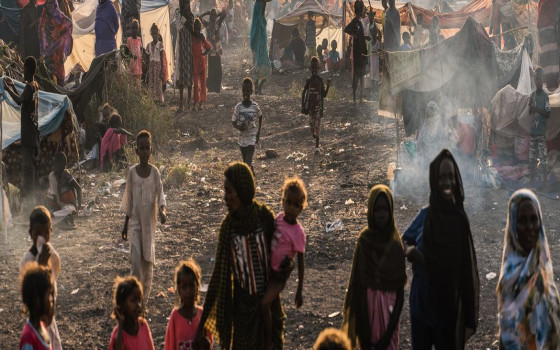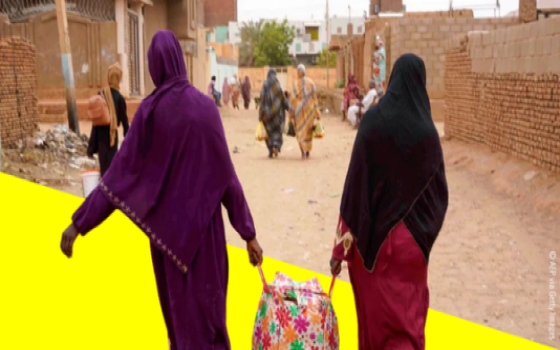UN: Women's Bodies Become a Crime Scene in Sudan; Crisis Worsens in North Darfur as Violence and Displacement Continue

- Europe and Arabs
- Wednesday , 12 November 2025 10:23 AM GMT
Khartoum: Europe and the Arabs
UN Women has warned that there is growing evidence that rape is being used "deliberately and systematically" in Sudan, stressing that women and girls "are not statistics, but a measure of our shared humanity."
The agency released a report Tuesday, included in the UN News Daily, focusing on the gender dimensions of food insecurity in Sudan. Speaking to reporters in Geneva after the report's release, Anna Motavati, UN Women's Regional Director for East and Southern Africa, said that every day "the world delays taking action on Sudan, another woman gives birth under bombardment, buries her child from starvation, or disappears without justice."
She said women reported suffering from hunger, displacement, rape, and bombing in El Fasher, "the heart of the latest catastrophe in Sudan," where "pregnant women gave birth in the streets after the last remaining maternity hospitals were looted and destroyed." The Rapid Support Forces (RSF) seized the capital of North Darfur state after a siege of more than 500 days in late October, amid reports of widespread atrocities, including summary executions and sexual violence. Ms. Mutafati said thousands of women and girls have fled the city due to the deteriorating situation, seeking refuge in other areas of North Darfur, including Tawila, about 70 kilometers away, Korma, and Mellit, where the humanitarian presence is “very limited.”
She added, “What the women are telling us is that during their harrowing journeys, every step they took to fetch water, collect firewood, or stand in line for food carried a high risk of sexual violence.”
Ms. Mutafati warned that women’s bodies “have become a crime scene in Sudan,” emphasizing that “there are no longer any safe places” where women can access protection or basic psychosocial support. The UN official said that “basic dignity has also collapsed,” explaining that a single pack of sanitary pads in North Darfur costs around $27, while the average humanitarian cash assistance provided is just under $150 a month for a family of six.
Ms. Mutafati spoke of the “impossible decisions” made by families “forced to choose between food, medicine, and dignity,” emphasizing that the basic needs of women and girls “are at the bottom of that list.”
She said: “Most women and girls in Sudan may not eat at all. Women often skip meals so their children can eat, while adolescent girls often receive the smallest portion, undermining their long-term nutrition and health.”
Ms. Mutafati warned that the hunger women are experiencing has a “ripple effect,” with health workers reporting an increase in cases of severe acute malnutrition among infants, which is often linked to their starving mothers’ reduced ability to breastfeed. She called for an end to the violence, expanded humanitarian access, and increased support for women-led soup kitchens and other aid providers. A food security assessment earlier this month confirmed famine in El Fasher and Kadugli, the capital of South Kordofan state.
Meanwhile, the UN Office for the Coordination of Humanitarian Affairs (OCHA) warned of a worsening crisis in Sudan’s North Darfur state as violence spreads beyond the state capital, El Fasher. Reports continue to indicate clashes along key access routes following the Rapid Support Forces’ capture of the city on October 26, which has trapped civilians and cut off aid.
Since then, nearly 89,000 people have fled El Fasher and surrounding villages, according to the International Organization for Migration. Many have sought refuge in the towns of Tawila, Mellit, and Saraf Omra, while others have been displaced to Debba in Northern State. The UN Office for the Coordination of Humanitarian Affairs (OCHA) said it is providing food, clean water, sanitation, healthcare, and psychosocial support, among other essential assistance, to displaced people in the Tawila area of North Darfur and the town of Ad-Dabba in Northern State, along with humanitarian partners. However, the needs far exceed available resources, according to the UN agency.
OCHA added that some families from El Fasher have sought refuge in the town of Tina, near the Sudanese-Chadian border, where local volunteers reported that more than 3,000 displaced people are in dire need of food, shelter, and healthcare. Across the border in eastern Chad, already overburdened host communities and UN partners are preparing to receive new arrivals as people continue to seek safety and assistance.
Meanwhile, violence is escalating in the Kordofan region, leading to increased civilian casualties and new waves of displacement, according to OCHA.
The World Health Organization (WHO) confirmed an attack on the Dilling hospital in South Kordofan State on November 6, which resulted in deaths and injuries. The organization noted that this was the 192nd verified attack on health facilities in Sudan since April 2023.
In neighboring North Kordofan state, the International Organization for Migration (IOM) reported that, as of Sunday, reported violence in the areas of Bara, Sheikan, Al-Rahad, Umm Ruwaba, and Umm Dam Haj Ahmed had displaced nearly 39,000 people in the past two weeks.
OCHA reported that more than 10,000 people had fled to White Nile state seeking safety, while others had fled to the Omdurman area of Khartoum state and other parts of North Kordofan.
OCHA reiterated its call for an immediate cessation of hostilities, the protection of civilians and humanitarian workers, an end to attacks on hospitals and civilian infrastructure, and safe and unimpeded humanitarian access to those in need throughout Sudan.














No Comments Found